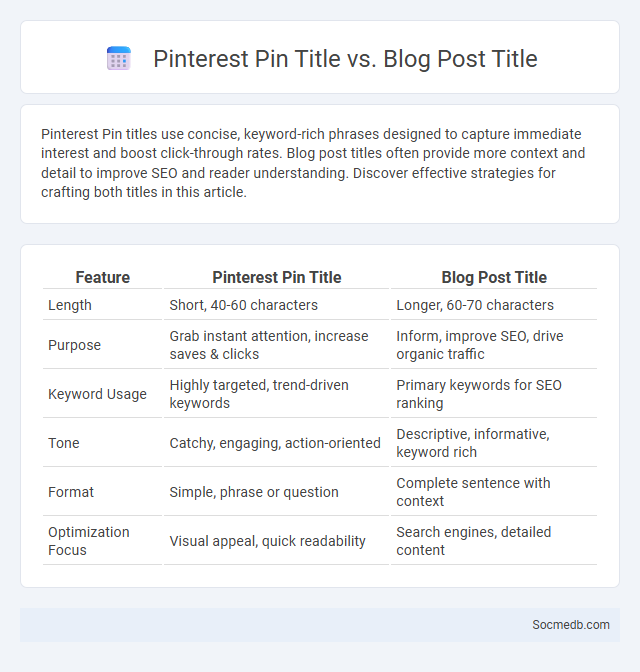
Photo illustration: Pinterest Pin title vs Blog post title
Pinterest Pin titles use concise, keyword-rich phrases designed to capture immediate interest and boost click-through rates. Blog post titles often provide more context and detail to improve SEO and reader understanding. Discover effective strategies for crafting both titles in this article.
Table of Comparison
| Feature | Pinterest Pin Title | Blog Post Title |
|---|---|---|
| Length | Short, 40-60 characters | Longer, 60-70 characters |
| Purpose | Grab instant attention, increase saves & clicks | Inform, improve SEO, drive organic traffic |
| Keyword Usage | Highly targeted, trend-driven keywords | Primary keywords for SEO ranking |
| Tone | Catchy, engaging, action-oriented | Descriptive, informative, keyword rich |
| Format | Simple, phrase or question | Complete sentence with context |
| Optimization Focus | Visual appeal, quick readability | Search engines, detailed content |
Understanding Pinterest Pin Titles
Crafting effective Pinterest pin titles requires incorporating relevant keywords that align with trending search queries to boost your visibility and drive engagement. Your pin titles should be concise yet descriptive, highlighting the core content while appealing to your target audience's interests. Understanding Pinterest's algorithm and user behavior helps optimize your titles for maximum reach and click-through rates.
What Makes a Blog Post Title Unique
A unique blog post title incorporates targeted keywords naturally while sparking curiosity through emotional or actionable language. It stands out by being concise yet descriptive, ensuring clarity about the content's value and relevance to the audience. Leveraging semantic SEO techniques, the title aligns with trending search queries, enhancing visibility and engagement across social media platforms.
Key Differences Between Pin Titles and Blog Titles
Pin titles on social media prioritize concise, keyword-rich phrases designed to capture immediate attention and drive clicks within visually-driven platforms like Pinterest. Blog titles, however, focus on descriptive and informative language that enhances SEO performance and clearly signals the article's content to search engines and readers. Effective pin titles use compelling calls-to-action and trend-specific terms, while blog titles optimize for long-tail keywords and readability to boost organic traffic.
How Pinterest Pin Titles Impact Visibility
Pinterest pin titles play a crucial role in enhancing your content's visibility by incorporating relevant keywords that align with popular search queries. Optimized titles improve pin discoverability in Pinterest's algorithm, boosting impressions and engagement rates. Crafting concise, descriptive, and keyword-rich titles ensures your pins reach a targeted audience, increasing traffic to your profile or website.
SEO Strategies for Blog Post Titles vs Pin Titles
Optimizing blog post titles for SEO involves incorporating high-value keywords and ensuring the title aligns with search intent to improve organic rankings, while pin titles on platforms like Pinterest emphasize visual appeal and concise, keyword-rich phrases that boost discoverability. Your blog post titles should balance clarity and keyword relevance to attract both search engines and readers, whereas pin titles benefit from a direct call to action or trending topics to maximize engagement and shares. Strategic keyword placement and audience targeting in both formats enhance your content's visibility across search engines and social media platforms.
Crafting Click-Worthy Pin Titles
Crafting click-worthy Pin titles on social media involves using clear, concise language that includes relevant keywords to boost visibility and engagement. Incorporating actionable words and specific benefits encourages users to click through for more information. Optimizing titles for Pinterest's search algorithm increases the chances of Pins appearing in targeted searches, driving higher traffic to your content.
Optimizing Blog Post Titles for Search Engines
Optimizing blog post titles for search engines involves incorporating relevant keywords that match your target audience's search intent while maintaining clarity and appeal. Crafting concise, descriptive titles with primary keywords at the beginning helps improve click-through rates and search engine rankings. Your title should balance SEO effectiveness with readability to attract both algorithms and readers.
Pin Title Best Practices for Engagement
Crafting an effective Pin title significantly boosts engagement by incorporating relevant keywords that align with popular search queries on Pinterest. Clear, concise titles between 40-60 characters optimize visibility and encourage clicks, as users often skim content for specific information. Including actionable language and trending terms increases the likelihood of repins and drives targeted traffic to your content.
Common Mistakes with Pinterest and Blog Titles
Using overly generic or keyword-stuffed Pinterest and blog titles reduces click-through rates and search engine ranking. Titles lacking clear relevance to the content create user confusion and increase bounce rates, negatively impacting site authority. Optimizing titles for both SEO and audience intent enhances engagement and drives targeted traffic to the content.
Tips for Aligning Pin and Blog Titles for Better Traffic
Aligning your Pin and blog titles with consistent keywords enhances SEO and increases click-through rates by delivering clear, relevant messaging to your audience. Craft titles that incorporate high-ranking search terms and maintain concise, engaging language to attract your target viewers effectively. Ensure your titles reflect the content accurately, improving user experience and boosting your overall social media traffic.
 socmedb.com
socmedb.com